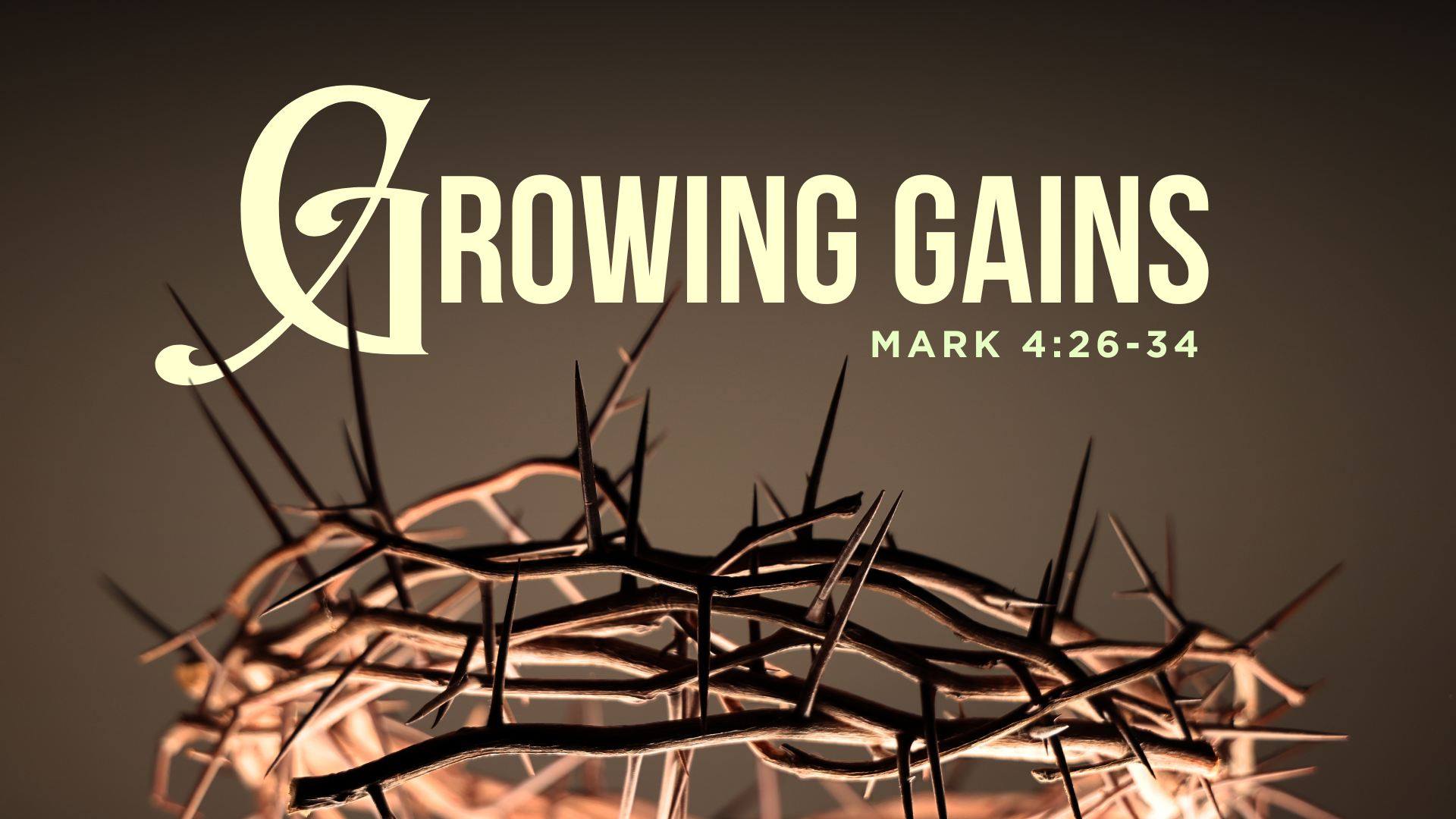
When Pigs Fly (Mark 5:1-20)
I had quite a scare recently. In the middle of the night, our dog started barking. It wasn’t her small chirp that lets us know she’s bored and would like to see what’s going on outside. No, this was as loud and tense as I’ve ever heard her – something had intruded.
I went out to the front room and there, in the shadows, I could make out a round, head shape at eye level, about 3 yards from me. It moved ever so slightly and I knew I had very little time to react. Instinctively, I turned on the light and now could see the intruder clearly: It was a birthday balloon that had wafted in from the other room when the A/C kicked on.
This section of Mark is fright night. I usually think of the encounter with the Gadarene demoniac as being a daytime event but Mark told us that it was evening when they got into the boat at Capernaum. Normally it takes about two hours to get to the other side of the sea.[1] Even assuming the storm slowed them down, there’s no reason for us to think it was yet morning.
Have you ever been followed at night? The disciples, who are already terrified as of chapter 4, verse 41, land on shore and see a grotesque man, bleeding, naked, staring them down as he ran toward them. Oh, and it’s all happening with a graveyard as the backdrop. Scary stuff.
Mark 5:1-2 – 1 They came to the other side of the sea, to the region of the Gerasenes. 2 As soon as he got out of the boat, a man with an unclean spirit came out of the tombs and met him.
The Gospel of Matthew and Luke both record this event. In Matthew we see there are two demon-possessed men. It’s not a contradiction, just a matter of story-telling perspective.
The Devil’s artillery failed to stop Jesus’ arrival, so he turned to troops. A legion of demons is dispatched to resist the Lord. Of course Jesus could have called down more than 12 legions of angels to protect Himself.[2] But Jesus Christ didn’t need bodyguards, even behind enemy lines.
The Gerasenes was Gentile controlled.[3] He’s in an unclean land, among unclean tombs, facing an unclean Gentile, full of unclean spirits. But, Jesus goes there so He might bring deliverance and preach the Good News. Exorcisms happened in the sacred synagogue and the Gentile graveyard.
Mark 5:3-5 – 3 He lived in the tombs, and no one was able to restrain him anymore—not even with a chain— 4 because he often had been bound with shackles and chains, but had torn the chains apart and smashed the shackles. No one was strong enough to subdue him. 5 Night and day among the tombs and on the mountains, he was always crying out and cutting himself with stones.
We want our heroes to be fantastically strong – Captain America, Wolverine, Mr. Incredible. Much different story when the monster next door has that kind of power. This guy had supernatural strength. When’s the last time you broke through metal chains? The whole community had tried to contain this menace with zero success. No one was strong enough to subdue him. You couldn’t bind him or stop him. In that description, Mark was using “as strong an expression as imaginable.”[4]
But now, let’s realize how horrible the situation was for the man himself. He was dying in slow motion. He lived among the dead. He was cast out to starve. He spent his days shouting into the dark and slicing his own flesh, his life ebbing away a little more each day.
If you’re not a Christian here tonight you need to know: This is you. I’m not saying you’re demon possessed, but you are dying in slow motion. You were born dead in trespasses and sins and no matter how strong you may feel, you are headed toward eternal death unless you are rescued and revived by Jesus Christ. There is salvation in no other name. But He wants to save you. That’s why He came to earth. To seek and to save the lost. He came to give you life.
Mark 5:6-8 – 6 When he saw Jesus from a distance, he ran and knelt down before him. 7 And he cried out with a loud voice, “What do you have to do with me, Jesus, Son of the Most High God? I beg you before God, don’t torment me!” 8 For he had told him, “Come out of the man, you unclean spirit!”
Your version may say the man came and “worshiped” Him, but let’s not get confused about what’s happening here. The demons are not singing praises. In fact, their opening line was a colloquial saying that meant something like, “What have I done to You that You should do this to me?”[5] In Matthew’s account, the demons also say to Jesus, “What a minute – You’re early. You’re here ‘before the time.’” And, as we’ve seen before, it seems the demons Jesus encountered sometimes tried to gain an upper hand against Him by using invoking His earthly name and heavenly title.[6])
The demons also try to boss Jesus around, demanding that He swear to God in an oath that He won’t torture them.[7] It’s ironic: They’re worried about being tormented after all they had done to this poor man. They made sport of torturing him. Luke says he had been that way for a long time.[8]
But it’s interesting – they had some measure of understanding, they immediately recognized Him. They knew His name. They knew He had absolute power that could not be withstood. But they were simultaneously in the dark about many other things when it came to Jesus and His work.
So, they were not worshiping Jesus. But they could not help but pay Him the homage He was due as the Son of the Most High God. Philippians tells us that at the name of Jesus every knee will bow, in heaven and on earth and under the earth, and every tongue will confess Jesus Christ is Lord.[9]
A person may mock Jesus, rebel against Him, run from His commands, but one day, Christ will return, and then they, too, will be on their knees before the King of kings.
Let’s recognize one more thing: They knew that Jesus and His Father were both merciful. That He might not destroy them, though that’s what they deserve. Did their master, the Devil, show any mercy to Job? Had they shown any mercy to this man? But the God of the Bible is a God of mercy.
Isaiah 30:18a – 18 Therefore the LORD is waiting to show you mercy, and is rising up to show you compassion…
Jesus was willing to show these unclean spirits a measure of mercy. Now, He was not willing to allow them to continue what they were doing to this poor man. And remember, Jesus came to seek and to save the lost. And these demons were feeding on one of those Christ came to save. And so He would not fail to rescue this man and bring him from death to life.
Mark 5:9-10 – 9 “What is your name?” he asked him. “My name is Legion,” he answered him, “because we are many.” 10 And he begged him earnestly not to send them out of the region.
There is some suggestion that demons are assigned and attached to certain areas, but that doesn’t mean we need to start doing demon maps or anything like that. Nor do we need to learn how to extract the name of demons so we can command them. The demons tried to play that game with Jesus and He is demonstrating that they have no power over Him, whatsoever.
Now, at the time, a Roman legion was about 6,000 soldiers.[10] That’s not a specific count for how many demons are in this guy, but it was a lot. I find it ironic that they really want to stay in that locale, but don’t mind being all cooped up together in a single guy.
Mark 5:11-13 – 11 A large herd of pigs was there, feeding on the hillside. 12 The demons begged him, “Send us to the pigs, so that we may enter them.” 13 So he gave them permission, and the unclean spirits came out and entered the pigs. The herd of about two thousand rushed down the steep bank into the sea and drowned there.
You FFA folks might think, “Pigs aren’t really herd animals.” Mark is highlighting the cosmic conflict going on here by using military images. The word he uses was often used of a band of military recruits. And Jesus dismisses the legion, almost like a commander.[11]
There’s another image hidden here for the original readers: The wild boar was the emblem of the Roman legion stationed in Palestine.[12] So here’s Jesus, in Gentile land, facing a legion, and in the end the pigs are driven into the sea.
Remember: Mark was primarily writing this book to Christians living in Rome and elsewhere in Italy.[13] So here is a subtle reminder that Jesus not only had power over legions of demons, but also over the godless legions of Rome and every other human kingdom. In the end, Christ conquers all.
Now, this situation raises a number of questions – some of which we simply can’t answer with total certainty. First, why did the demons want to go into the pigs? Well, there’s some indication in the New Testament that these sort of spirits want to inhabit other living creatures. There’s a second possible reason we’ll get to in a moment.
The second question is: Why did Jesus allow this? Doesn’t He care about the pigs? God absolutely cares about animals. But this does highlight God’s priorities. A single human life is much more important than even thousands of pigs.[14] In Matthew 12, Jesus says outright, “A person is worth far more than a sheep.” That doesn’t mean it’s ok for people to mistreat animals, but when lives hang in the balance, God goes with the human every time. Because humans are created in His image. You are not the same as an animal. You are a human, and that is a unique being in God’s order.
Before we move on, one more quick reminder for us, especially anyone who is not a believer here. Take a good long look at the naked, bloody suffering of the demon possessed man. Try to hear the chilling screams of the pigs as they drown in the sea. That is the devil’s plan for you. That is what sin does every time. The road of sin leads to your grave. The road of salvation leads to life everlasting.
Perhaps Jesus allowed this so that this poor man would know he was really, truly safe. That the demons were gone and they would not return to trap him again. Because He wanted to remind us:
Micah 7:19 – 19 He will again have compassion on us; he will vanquish our iniquities. You will cast all our sins into the depths of the sea.
That’s what Jesus does when He forgives us because He delights in His faithful love toward us.
Mark 5:14-17 – 14 The men who tended them ran off and reported it in the town and the countryside, and people went to see what had happened. 15 They came to Jesus and saw the man who had been demon-possessed, sitting there, dressed and in his right mind; and they were afraid. 16 Those who had seen it described to them what had happened to the demon-possessed man and told about the pigs. 17 Then they began to beg him to leave their region.
So, like the 12, these Gentiles were afraid. Terrified because they did not understand Who Jesus was. They don’t glorify God. They don’t think, “Maybe we should hear more from this miracle worker.” No, they go right to: “Would You please leave?”
We’d expect people to say, “Hey, I know this other person who is demon possessed,” or, “I’ve got this sick family member, let me go get them.” But they were not interested. And perhaps that is why the demons asked to go into the pigs. Maybe they knew these people well enough to know they cared more about their sows than their souls.
Now, turn from the crowd to the man. He has been totally transformed. He’s gone from screaming to serene. From naked to clothed. And we’ll see this wasn’t just him feeling a little better, but his mind is fixed. His desires and behavior are changed. Now he has strength for life not just death.
But there he is, seated and clothed. Jesus didn’t just deliver him, but also provided for him. Perhaps the cloak was Peter’s or John’s. Maybe it was Jesus’! But he was made well, from the inside out.
Mark 5:18-20 – 18 As he was getting into the boat, the man who had been demon-possessed begged him earnestly that he might remain with him. 19 Jesus did not let him but told him, “Go home to your own people, and report to them how much the Lord has done for you and how he has had mercy on you.” 20 So he went out and began to proclaim in the Decapolis how much Jesus had done for him, and they were all amazed.
After all that, Jesus gets right back in the boat to go back to Jewish territory. You know, Jesus does not stay where He isn’t wanted.[15] When a nation, a community, a family, or a church says, “We don’t trust You, we’re not interested in Your opinion or Your leading,” then the Lord withdraws Himself. That should be a very sobering thought for us. It happened to churches in the New Testament. Instead of allowing pride or fear or misunderstanding to determine our relationship to Jesus, we should be like this Gerasene man. He begged to remain with Jesus.
That’s an interesting phrase – it’s exactly how disciples were described back in chapter 3. The 12 were those He appointed to be with Him and to be sent out to preach. This man was instantly filled with a desire for discipleship.
And Jesus says no?!? What in the world is going on here? Well, let’s remember: This is a Gentile. Jesus’ ministry at this point in time was not to the Gentile world – not yet. And bringing a Gentile into the group would’ve caused significant problems among the Jews. But did Jesus say this man couldn’t be a disciple? Actually, the Lord sent him out to proclaim the Gospel in the Decapolis as the Gentile world’s first missionary. To go and spread the word of God’s power and His mercy. And the man does it, fearlessly. The disciples were afraid. The crowds were afraid. But the one who was delivered had no fear. He became a proclaimer just like John the Baptist had been a proclaimer.
As we close, a couple thoughts about discipleship. On one level, it is shocking to us that Jesus would allow the demons to go where they wanted, but not allow this man to come follow Him. But, the Lord knows what is best and what is needful. One commentator writes, “Jesus’ answer [to this man] shows how impossible it is to have a stereotyped definition of discipleship. One person is taken away from home and family, another is sent back to them contrary to his own wishes.”[16]
Will we allow the Lord to set the destinations and directives of our lives? That’s what real discipleship is. To kneel before Him, not because we were compelled by His power, but because we are compelled by our love for Him. A love that trusts and obeys.
And second, notice Jesus did not send this man out with power to perform any miracles. What did he have? His transformed life was the demonstration of God’s power. The changes in his life were the visible proof of God’s mercy, of God’s love, of God’s truth, of God’s activity. Now, the Lord may do miraculous things through you, but that’s not what we really need to make a difference in the world. Your life, changed by the Gospel, is proof enough. Your heart, your mind, your attitude, your choices, your hope when transformed by the love of God is enough to make an unbelieving world marvel.
| ↑1 | William Lane The Gospel Of Mark |
|---|---|
| ↑2 | Matthew 26:53 |
| ↑3 | The NET Bible First Edition Notes |
| ↑4 | Clifton Allen Matthew-Mark |
| ↑5 | NET |
| ↑6 | David Garland Mark (see also Gaebelein, Witherington, Lane |
| ↑7 | Frank Gaebelein, D. A. Carson, Walter Wessel, and Walter Liefeld The Expositor’s Bible Commentary, Volume 8: Matthew, Mark, Luke |
| ↑8 | Luke 8:27 |
| ↑9 | Philippians 2:10-11 |
| ↑10 | Morna Hooker The Gospel According To Saint Mark |
| ↑11 | Ben Witherington The Gospel Of Mark: A Socio-Rhetorical Commentary |
| ↑12 | Witherington |
| ↑13 | Third Millennium Ministries The Gospel According To Mark |
| ↑14 | Witherington |
| ↑15 | Gaebelein |
| ↑16 | Eduard Schweizer The Good News According To Mark |







